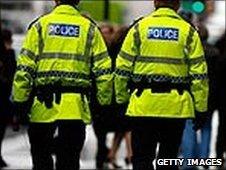Rank-and-file officers reject cuts in police numbers
- Published

Scotland's police forces have been warned of "unprecedented challenges"
The Scottish Police Federation has rejected what it has called the "acquiescence" of senior officers in contemplating cuts to the service.
The organisation's joint central committee said police numbers should not be reduced with an expected rise in crime due to the economic situation.
It said efficiency savings had already been achieved across the service.
Justice Secretary Kenny MacAskill has warned Scotland's police forces of "unprecedented challenges" ahead.
Rab Milligan, vice-chair of the Scottish Police Federation, said: "We realise what the current economic situation is like and we are not against cuts per se.
"But what we are against is cuts to officer numbers and some tacit acceptance that seems to be the answer."
Mr Milligan said history had shown crime and anti-social behaviour was likely to rise during an economic recession.
'Reduced service'
He acknowledged about 84% of police costs related to staffing, but argued savings in administrative work should be examined before any cutbacks to frontline services are considered.
"The first duty of any government is safety and security and drops in officer numbers are just going to result in reduced service," Mr Milligan added.
At a meeting in Nairn, the federation's committee also said the police service in Scotland should not bear cuts as part of any reductions in Barnett Formula funding.
It argued less is spent per head of population on the Scottish police service than south of the Border.
However the federation, which represents rank-and-file officers, reiterated that it will co-operate in the search for further savings through a re-examination of court duties and shared services.
- Published14 June 2010
- Published4 June 2010
- Published1 June 2010